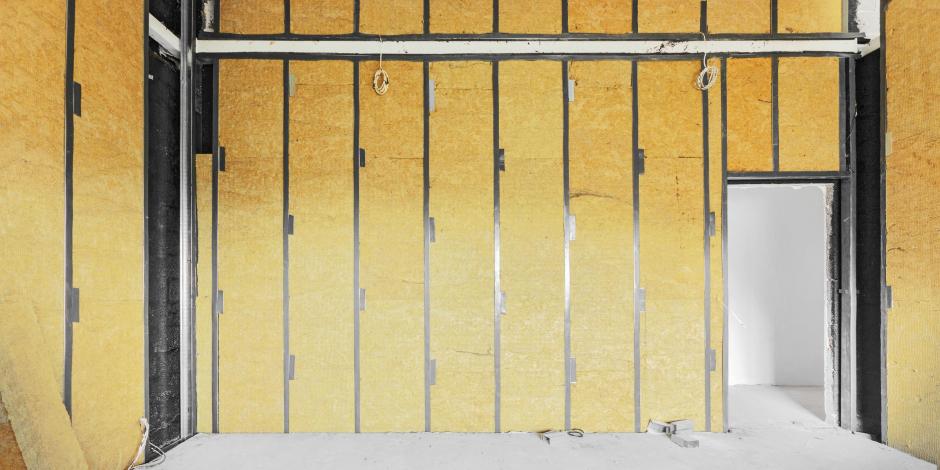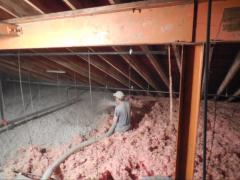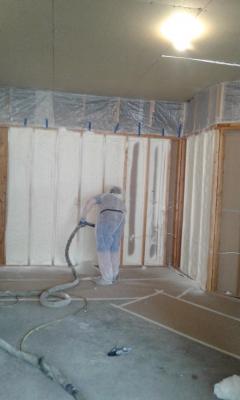- Residential
- Commercial & Municipal
- Building Consulting
July 13, 2022

In commercial buildings, increasing insulation levels can significantly improve energy efficiency and occupant comfort. A properly insulated building will lower energy costs and improve the performance of HVAC equipment while ensuring building durability.
Not all insulation is created equal, however. At Accurate-Airtight Exteriors, we will help you understand the benefits of different types of insulation for offices, retail buildings, schools, churches, warehouses, and other commercial buildings. We believe all types of insulation can work well if installed properly and used for the correct purpose, and we will work with you to install a product that both fits your needs and financial goals.
Finding the Right Commercial Insulation Material
Depending on the areas you are insulating, there are several types of insulation used for commercial buildings, including:
Cellulose insulation
Two part closed cell spray foam insulation
Open cell spray foam insulation
Rigid foam board insulation
Fiberglass insulation
Not all insulators are equal in R-value and performance, but they can all perform at their max capacity if installed correctly. Another thing to remember is air sealing—when used in conjunction with strategic insulation placement, commercial air sealing will ensure your building’s insulation is performing as intended.
Cellulose Insulation

Cellulose Insulation is made from recycled wood fiber, primarily newspaper. Specifically treated and processed, cellulose fiber is light and fluffy. The natural characteristics of cellulose trap air within and between the fibers, providing superior insulating qualities. It can be “dense packed” in a confined space under high pressure to create a solid mass with the highest R-value. When blown into place using a specially designed high-pressure installation process, the tiny cellulose fibers flow around pipes and wiring, sealing cracks and corners and forming a felt-like bond.
Cellulose insulation provides complete coverage, blocking more air infiltration and keeping your interior environment more consistent while requiring less heating or cooling energy. Cellulose insulation can often be one of the most efficient, safest, healthiest, and cost-effective insulation types for commercial buildings.
Spray Foam Insulation

Two-part foam insulation, often called spray foam, comes in a higher R-value closed cell version and also a lower R-value open cell form. Both are effective and are often considered superior forms of insulation. Spray foam is a polyurethane product that clings to and expands on the surface onto which it is sprayed. It is good for hard-to-reach spaces.
As it expands, it tends to fill gaps and cracks, creating an effective air barrier. In this way, spray foam can be used for both insulating and air sealing.
Fiberglass Insulation
Fiberglass, although popular, is the least valuable of the options available. It only works effectively when insulating an airtight six-sided box—four sides, a top, and a bottom. Its insulating R-value is significantly reduced when exposed to moving air (one of the reasons why air sealing is so important).
Unlike cellulose and 2-part spray foam, fiberglass is difficult to install tightly or in hard-to-reach areas, and any cracks or gaps in the insulation coverage will allow heat to leak through. Similarly, fiberglass does not have the structure to prevent air flow (this is why it is used as a filter in some cases, such as cigarette filters and furnace filters).
Schedule a Commercial Building Inspection with Accurate-Airtight Exteriors Today
No matter the insulation needs of your building, Accurate-Airtight Exteriors will work with you to provide building science-sound information and recommendations for an insulation material that will deliver years of lower heating and cooling bills and improved indoor comfort. Since 1998, our team of insulation and air barrier professionals has worked on commercial buildings throughout Wisconsin, Minnesota, Illinois, Iowa, and Michigan. We can give you our best recommendations following a commercial building inspection, where we can identify the source of energy waste, high heating and cooling costs, ice dams, mold, and much more, and provide a recommended list of services and commercial insulation types to help address the problem for good.
